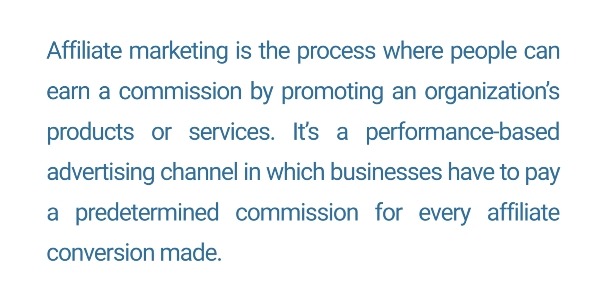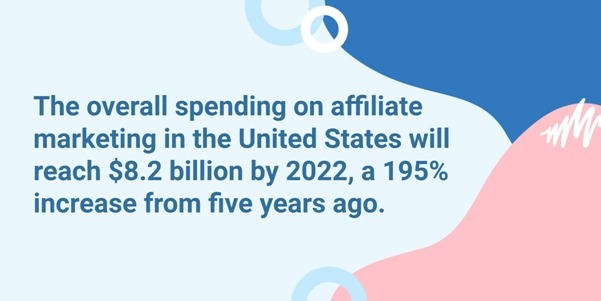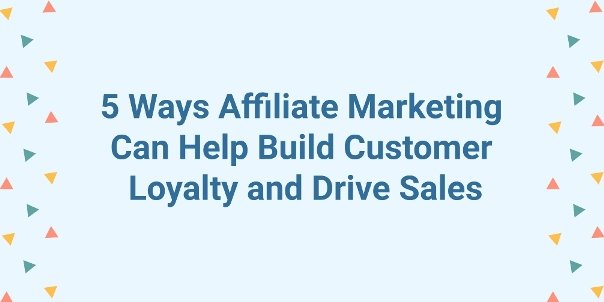Let’s face it: coronavirus has brought on a global crisis, pushing countries to the brink of an economic disaster—something that nobody saw coming.
In response to this, there has been a shift in the priorities and approach of customers, which is why brands need to reevaluate and make adjustments in their marketing strategies as soon as possible. Surprisingly, it seems like the best solution to do this is by embracing affiliate marketing.
Why, you ask? Affiliate marketing is the only way that brands can connect with customers and retain their loyalty—at least for now.
You see, everybody is staying home because of the ongoing quarantine, which considerably restricts offline marketing efforts. On top of this, digitalization is bringing a conscious change in the way people consume content, choosing digital platforms over print.
Today, buyers prefer having access to educational products such as ebooks, mini-courses, brochures, etc., on online platforms to learn more about a brand and what it has to offer as opposed to generic banners or images. Even social media marketing is readily gaining popularity over traditional marketing.
These changing trends shed light on how business organizations should utilize affiliate marketing to promote their content-driven products. Doing this will not only generate more leads at a lower cost but will eventually drive sales as well, particularly because of the ongoing pandemic.
In this article, we'll discuss affiliate marketing in more detail and how it can be useful for building customer loyalty, along with the best tips to help you set up a successful affiliate marketing program for driving sales.
What is Affiliate Marketing?

“Affiliate marketing has made businesses millions and ordinary people millionaires.” – Bo Bennett, the founder and CEO of eBookIt, and president of Archieboy Holdings.
Affiliate marketing is the process where people can earn a commission by promoting an organization’s products or services. It’s a performance-based advertising channel in which businesses have to pay a predetermined commission for every affiliate conversion made.
This marketing strategy is also very effective, especially in terms of reach and cost.
Businesses need to focus on creating content that can convert more customers, irrespective of the size of operations. But when it comes to affiliate marketing, there are zero risks since you only need to pay after the results are delivered.
With nearly 81% of brands already having an affiliate program, it’s high time to get into affiliate marketing if you aren’t already.
5 Ways How Affiliate Marketing Can Help Your Business Even During the Pandemic
Things are getting complicated for B2B as well as B2C companies considering customer acquisition costs have increased by roughly 60% in the last five years.

Keeping this in mind, the diversity provided by affiliate marketing can be great for generating more revenue. According to a Statista report, the overall spending on affiliate marketing in the United States will reach $8.2 billion by 2022, a 195% increase from five years ago. So if you have been looking for any more motivation to join the affiliate marketing bandwagon, here it is.
The following are a few ways in which affiliate marketing can be a boon for businesses, helping them prolong their survival.
#1 Increasing Targeted Traffic
Since we live in a digital age, every business needs to work on establishing a solid online presence for driving traffic. However, the management of SEO—ranking a website in Google’s search results—is a long, arduous process.
When you work with an affiliate who understands your target audience, you‘ll be able to generate more targeted traffic. Also, as your affiliate already pre-qualifies the traffic, it becomes easier for you to maintain relationships and engage with prospects, while simultaneously creating brand awareness.
Of course, you can keep your audience engaged by posting authentic and visually-appealing content, but there is still a need for ensuring your marketing efforts get good traffic. In other words, your visitors should return to your site and not bounce away.
#2 Better Reach
One of the biggest advantages of running an affiliate marketing program is expanding market reach without any heavy investment. It also enables you to educate customers about the benefits of your content-driven products.
Imagine this: you have 30 affiliates in your program, each given the task of promoting your online courses. You’ll get publicity every time these affiliates promote the courses to their entire audiences. With the reach expanding to thousands of people, the number of brand impressions here is enormous.
#3 Loyal Long-Term Partnerships
You should try to look for affiliates that can generate additional income through their marketing efforts.
Similarly, even affiliate marketers want to collaborate with brands that have higher paying affiliate programs. This will help them create a reliable source of online income by earning solid commissions. They would then want to continue working with your brand and do their best to ensure you get higher returns to keep the partnership intact.
This is how affiliate marketing creates a mutually beneficial relationship from the point of your brand, as well as the affiliate.
#4 Nurturing Customer Relationships
Affiliate marketing does an excellent job of converting leads into customers. Affiliates can offer new customer bonuses, lead magnets, and so on for this purpose. However, it's important for the company and the affiliate to work in tandem to achieve the best results.
With a rich customer base in place, your next objective should be customer retention by creating loyalty otherwise all your affiliate marketing efforts will be in vain. We would recommend launching an email marketing campaign for engaging with your “qualified” email list and keeping them in the loop about your products or services.
Ultimately, you’ll be able to deepen customer relationships and boost revenue by selling them quality products and services that not only address their pain points but also add value.
#5 Increased Revenue
In terms of returns, again, affiliate marketing creates faster means of revenue being a low-cost and effective marketing strategy. With increasing brand awareness and better conversions, there are higher chances for you to earn more despite limited start-up costs.
Don't get us wrong, we aren’t saying that starting an affiliate program is free. But your total time, resource, and money investment are much lower when compared to other marketing tactics.
This marketing strategy enables you to generate a parallel source of revenue to your core activities, giving you more time to focus on different aspects of your business.
How to Set-Up and Manage a Successful Affiliate Program?
Here, we’ll discuss the different steps of launching and managing an affiliate program the right way:
Carefully Select Your Affiliate Platform
Choosing the right affiliate platform that allows you to manage every single aspect of the program is very important. It’ll help you recruit affiliates, upload ads, run tracking analytics, and determine commission payouts—all in one central place.
Luckily, there are multiple large as well as small affiliate platforms that you can choose from. Don’t forget to concentrate on the reach—whether national or international—as well.
Define the Affiliate Program Structure
What will be the operating parameters for your program? Do you want to pay a commission for leads? Or do you want to pay a commission for sales? Would you offer a flat fee or a percentage?
Find out the answers to these questions and make decisions regarding the calculation of commissions, tracking cookies, and of course, a well thought-out terms and conditions list for your campaign.
For cookies especially you need to figure out the total validity. While 30 days is standard for crediting an affiliate, there is always an option to opt for longer or shorter durations.
Develop a Great Affiliate Marketing Strategy
Use your digital marketing skills to chalk out an effective marketing strategy, developing tactical collaterals like images, landing pages, ebooks, etc.
Affiliates often publish blogs, podcasts, and use social media for promotion. Think of how you can collectively support their content creation efforts that speak in favor of your product. Brainstorm ways to ascertain the audience understands how your ebook or mini-course can help them in their endeavors.
Recruit the Best Affiliates
You should recruit top-notch affiliates who share the same target audience as yours and produce high-quality content. Make sure they regularly engage online and have interests that align with your brand to avoid any complications in the future.
Keep Evaluating and Improving
Launching an affiliate program is only half the battle.
You have to work together with the affiliates, supporting them by solving their queries and keeping them happy. At the same time, keep monitoring your affiliate program to identify improvement opportunities.
Your end goal should be to enhance the effectiveness of your affiliate program that will then help to maximize the return on your efforts.
Summing Up
Despite COVID-19 limiting the availability of sales opportunities, affiliate marketing lets brands create strategic partnerships with affiliates to boost revenue. These marketers help businesses enhance their brands by connecting with a wider audience online and offline. Affiliates can also promote products through social media and other verticals.
In fact, it’s easy to see that brands who sought out affiliates will be the ones with a loyal customer base and a stable source of revenue once the crisis is over. So if you want to protect your business from the adverse effects of the pandemic, start working on creating an affiliate program right away.





